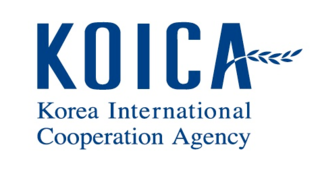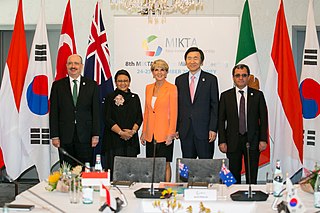See also
- National Partnership for Reinventing Government – Similar U.S. project in 1990s
The United Nations Project Office on Governance (UNPOG) was established in 2006 as a subsidiary organization of the United Nations Department of Economic and Social Affairs (UNDESA) and is headquartered in Seoul, the Republic of Korea. Its principal mission is to assist the United Nations Member States improve their governance capacity. Since its inception, it has conducted research and capacity-building activities and disseminated global and local best practices on participatory, transparent and effective democratic governance. [1]
The office was established as an outcome of the Sixth Global Forum on Reinventing Government, [2] hosted by the Republic of Korea in cooperation with the United Nations in May 2005. [3] At the conclusion of the Sixth Global Forum, participants endorsed the Seoul Declaration on Participatory and Transparent Governance, which called for the creation of the United Nations Governance Centre (UNGC). [4] A Technical Cooperation Trust Fund Agreement was concluded between the Republic of Korea and the United Nations in June 2006. The office was officially renamed to its current title in January 2009. [5]
The office is in partnership with the United Nations Public Administration Network (UNPAN), [6] which is operated by the Division for Public Administration and Development Management branch of the United Nations Department of Economic and Social Affairs.

The United Nations Development Programme (UNDP) is the United Nations' global development network. It promotes technical and investment cooperation among nations and advocates for change and connects countries to knowledge, experience and resources to help people build a better life for themselves. The UNDP provides expert advice, training and grants support to developing countries, with increasing emphasis on assistance to the least developed countries. UNDP works with nations on their own solutions to global and national development challenges. As they develop local capacity, they draw on the people of UNDP and its wide range of partners. However UNDP offers to help only if the different nations request it to do so.

The Asia-Pacific Economic Cooperation (APEC) is an inter-governmental forum for 21 member economies in the Pacific Rim that promotes free trade throughout the Asia-Pacific region. Following the success of ASEAN's series of post-ministerial conferences launched in the mid-1980s, APEC started in 1989, in response to the growing interdependence of Asia-Pacific economies and the advent of regional trade blocs in other parts of the world; it aimed to establish new markets for agricultural products and raw materials beyond Europe. Headquartered in Singapore, APEC is recognized as one of the highest-level multilateral blocs and oldest forums in the Asia-Pacific region, and exerts a significant global influence.
Governance comprises all of the processes of governing – whether undertaken by the government of a state, by a market or by a network – over a social system and whether through the laws, norms, power or language of an organized society. It relates to "the processes of interaction and decision-making among the actors involved in a collective problem that lead to the creation, reinforcement, or reproduction of social norms and institutions". In lay terms, it could be described as the political processes that exist in and between formal institutions.
Aid effectiveness is the effectiveness of development aid in achieving economic or human development. Following the Cold War in the late 1990s, donor governments and aid agencies began to realize that their many different approaches and requirements for conditioning aid were imposing huge costs on developing countries and making aid less effective. They began working with each other, and with developing countries, to harmonize their work to improve its effect. Aid agencies are always looking for new ways to improve aid effectiveness, including conditionality, capacity building and support for improved governance.

The Korea Foundation is a non-profit public diplomacy organization established in 1991 to promote a better understanding of Korea and strengthen friendships in the international community. The Foundation carries out various projects for exchange between the Republic of Korea and foreign countries to cultivate mutual understanding.

The Republic of China government recognized the formation of the Provisional Government of the Republic of Korea on April 13, 1919, as one of the participants of the Cairo Conference, which resulted in the Cairo Declaration. One of the main purposes of the Cairo Declaration was to create an independent Korea, free from Japanese colonial rule. Bilateral diplomatic relations between the Government of Republic of Korea and the Republic of China began in 1948, just after the foundation of the First Republic. After the Chinese Civil War in 1949, the Republic of Korea maintained relations with the Republic of China (Taiwan).

Fiji–South Korea relations refers to bilateral relations between Fiji and South Korea. The two countries established official diplomatic relations in January 1971, Korea having recognised Fiji's accession to independence the previous year. There is a South Korean embassy in Suva and a Fijian embassy in Seoul. Fiji opened its embassy in Seoul in July 2012 to "foster trade and investment" and to "promote people-to-people exchanges".

Denmark–South Korea relations refers to the current and historical relations between Denmark and South Korea. Denmark has an embassy in Seoul. South Korea has an embassy in Copenhagen. Diplomatic relations were established on 11 March 1959.

The Korea International Cooperation Agency was established in 1991 by the Ministry of Foreign Affairs of South Korea as a governmental organization for Official Development Assistance (ODA) to enhance the effectiveness of South Korea's grant aid programs for developing countries by implementing the government's grant aid and technical cooperation programs. It is led by three-year-term president of the board who is appointed by the President upon the recommendation of Foreign Minister.
The Regional Forum on Environment and Health in Southeast and East Asian Countries is a global framework for action provided by Agenda 21 of the 1992 United Nations Conference on Environment and Development; the Johannesburg Plan of Implementation of 2002 World Summit on Sustainable Development; the Millennium Development Goals of the United Nations and the recommendations of the fifth Ministerial Conference on Environment and Development in Asia and the Pacific on enhancing the environmental sustainability of economic growth. The second Ministerial Regional Forum was held 14–16 July 2010 in Jeju Province, South Korea. The forum is held every three years; the first was in Bangkok in August 2007.
The Presidential Council on Nation Branding, Korea was established on January 22, 2009 by Executive Decree 21283 with the objective to promote Korea's global image; to right misconceptions about Korea, its culture, its products, and its people; and to raise respect for Korea so as to support Korean businesses and nationals abroad through governmental initiated strategies and policies. The council lies under the direct control and authority of the President of South Korea, Moon Jae-in.
Haiyan Qian (钱海燕) was the Director of the Division for Public Administration & Development Management (DPADM), United Nations Department of Economic and Social Affairs (UNDESA).
The International Centre for Policy Studies (ICPS) is an independent NGO, founded in 1994 which aims to promote public policy concepts and practice and apply them to influential policy research that affects both the public and private sectors in Ukraine.

MIKTA is an informal partnership between Mexico, Indonesia, South Korea, Turkey and Australia. It is led by the Foreign Ministers. It was created in 2013 on the sidelines of the United Nations General Assembly in New York City and aims to support effective global governance.
The Global Forum on Migration and Development (GFMD) is a state-led, informal and non-binding process, which helps shape the global debate on migration and development. It provides a flexible, multi-stakeholder space where governments can discuss the multi-dimensional aspects, opportunities and challenges related to migration, development, and the link between these two areas. The GFMD process allows governments - in partnership with civil society, the private sector, the UN system, and other relevant stakeholders – to analyze and discuss sensitive issues, create consensus, pose innovative solutions, and share policy and practices.
Multistakeholder governance a practice of governance that employs bringing multiple stakeholders together to participate in dialogue, decision making, and implementation of responses to jointly perceived problems. The principle behind such a structure is that if enough input is provided by multiple types of actors involved in a question, the eventual consensual decision gains more legitimacy, and can be more effectively implemented than a traditional state-based response. While the evolution of multistakeholder governance is occurring principally at the international level, public-private partnerships (PPPs) are domestic analogues.
Cities Alliance is a global partnership fighting urban poverty and supporting cities to deliver sustainable development. To manage its activities, the Cities Alliance operates a multi-donor fund with UNOPS as host and Trustee. Currently 29 diverse members that provide strategic direction, contribute to the financing of the Fund, and engage in advocacy and operational activities to realize sustainable development. Cities Alliance aims to enhance the well-being of urban populations by delivering innovative, multi-sectoral solutions to urban poverty.
Government competitiveness is a new concept created by Tobin Im, a scholar of public administration and a professor at the Graduate School of Public Administration at Seoul National University. Since 2011, Center for Government Competitiveness (CGC) at Seoul National University has developed the Government Competitiveness (GC) index which evaluates government achievements in the various fields and furthermore provides policy recommendations to increase competitiveness of government in the future.
The International Association of Economic and Social Councils and Similar Institutions, an association under Dutch law, is established in Brussels, Belgium and has been founded on 1 July 1999, in Port Louis, Mauritius.
The Belt and Road Forum for International Cooperation is an international political and economical forum.